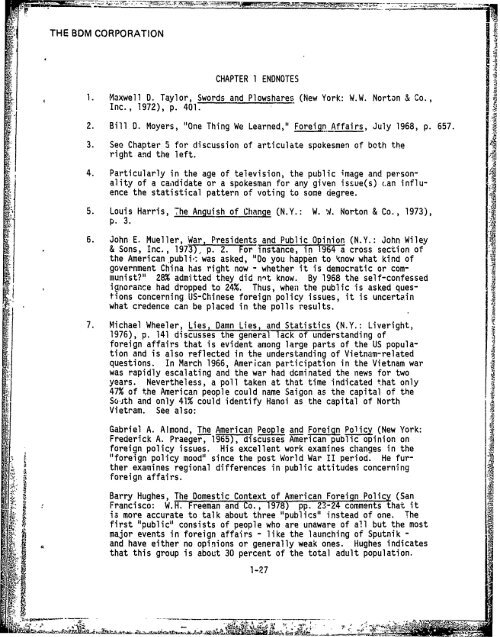policy - The Black Vault
policy - The Black Vault
policy - The Black Vault
You also want an ePaper? Increase the reach of your titles
YUMPU automatically turns print PDFs into web optimized ePapers that Google loves.
THE BDM CORPORATION<br />
CHAPTER 1 ENDNOTES<br />
1. Maxwell D. Taylor, Swords and Plowshares (New York: W.W. Norton & Co.,<br />
Inc., 1972), p. 401.<br />
2. Bill D. Moyers, "One Thing We Learned," Foreign Affairs, July 1968, p. 657.<br />
3. See Chapter 5 for discussion of articulate spokesmen of both the<br />
right and the left.<br />
4.<br />
-44<br />
Particularly in the age of television, the public image and personality<br />
of a candidate or a spokesman for any given issue(s) c.an influ- -A<br />
ence the statistical pattern of voting to some degree.<br />
5. Louis Harris, <strong>The</strong> Anguish of Change (N.Y.: W. W. Norton & Co., 1973),<br />
p. 3.<br />
6. John E. Mueller, War, Presidents and Public Oinion (N.Y.: John Wiley<br />
& Sons, Inc., 1973), p. 2. For instance, in 1964 a cross section of<br />
the Americanpublic was asked, "Do you happen to know what kind of<br />
government China has right now - whether it is democratic or communist?"<br />
28% admitted they did nnt know. By 1968 the self-confessed<br />
ignorance had dropped to 24%. Thus, when the public is asked questions<br />
concerning US-Chinese foreign <strong>policy</strong> issues, it is uncertain<br />
what credence can be placed in the polls results.<br />
7. Michael Wheeler, Lies, Damn Lies, and Statistics (N.Y.: Liveright,<br />
1976), p. 141 discusses the general lack of understanding of<br />
foreign affairs that is evident among large parts of the US population<br />
and is also reflected in the understanding of Vietnam-related<br />
questions. In March 1966, American participation in the Vietnam war<br />
was rapidly escalating and the war had dcminated the news for two<br />
years. Nevertheless, a poll taken at that time indicated t hat only<br />
47% of the American people could name Saigon as the capital of the<br />
So.jth and only 41% could identify Hanoi as the capital of North<br />
Vietram. See also:<br />
Gabriel A. Almond, <strong>The</strong> American People and Foreig.n Policy (New York:<br />
Frederick A. Praeger-, 1965), discusses American public opinion on<br />
4 foreign <strong>policy</strong> issues. His excellent work examines changes in the<br />
r "foreign <strong>policy</strong> mood" since the post World War II period. He further<br />
examines regional differences in public attitudes concerning<br />
foreign affairs.<br />
Barry Hughes, <strong>The</strong> Domestic Context of American Foreign Policy (San<br />
Francisco: W.H. Freeman and Co., 1978) pp. 23-24 comments that it<br />
t is more accurate to talk about three "publics" instead of one. <strong>The</strong><br />
first "public" consists of people who are unaware of all but the most<br />
major events in foreign affairs - like the launching of Sputnik -<br />
and have either no opinions or generally weak ones. Hughes indicates<br />
that this group is about 30 percent of the total adult population.<br />
1-27<br />
_77,'<br />
A X.J
















